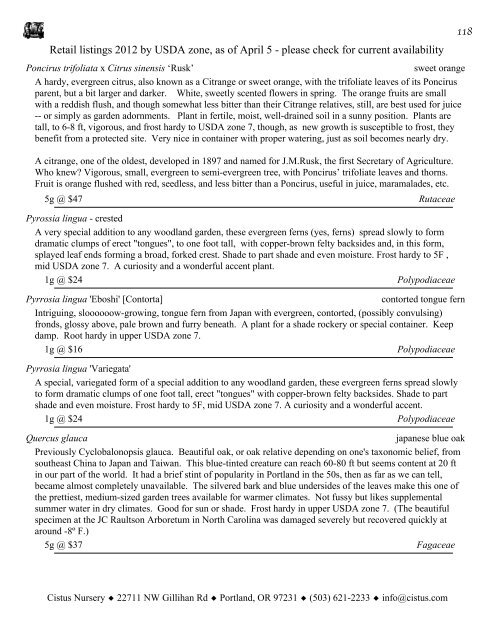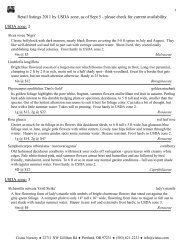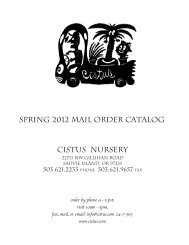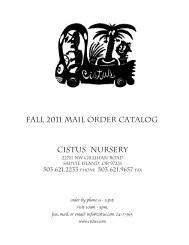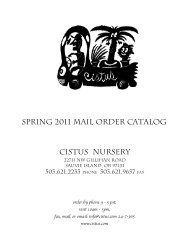1 Retail listings 2012 by USDA zone, as of April 5 ... - Cistus Nursery
1 Retail listings 2012 by USDA zone, as of April 5 ... - Cistus Nursery
1 Retail listings 2012 by USDA zone, as of April 5 ... - Cistus Nursery
Create successful ePaper yourself
Turn your PDF publications into a flip-book with our unique Google optimized e-Paper software.
<strong>Retail</strong> <strong>listings</strong> <strong>2012</strong> <strong>by</strong> <strong>USDA</strong> <strong>zone</strong>, <strong>as</strong> <strong>of</strong> <strong>April</strong> 5 - ple<strong>as</strong>e check for current availability<br />
Poncirus trifoliata x Citrus sinensis ‘Rusk’ sweet orange<br />
A hardy, evergreen citrus, also known <strong>as</strong> a Citrange or sweet orange, with the trifoliate leaves <strong>of</strong> its Poncirus<br />
parent, but a bit larger and darker. White, sweetly scented flowers in spring. The orange fruits are small<br />
with a reddish flush, and though somewhat less bitter than their Citrange relatives, still, are best used for juice<br />
-- or simply <strong>as</strong> garden adornments. Plant in fertile, moist, well-drained soil in a sunny position. Plants are<br />
tall, to 6-8 ft, vigorous, and frost hardy to <strong>USDA</strong> <strong>zone</strong> 7, though, <strong>as</strong> new growth is susceptible to frost, they<br />
benefit from a protected site. Very nice in container with proper watering, just <strong>as</strong> soil becomes nearly dry.<br />
A citrange, one <strong>of</strong> the oldest, developed in 1897 and named for J.M.Rusk, the first Secretary <strong>of</strong> Agriculture.<br />
Who knew? Vigorous, small, evergreen to semi-evergreen tree, with Poncirus’ trifoliate leaves and thorns.<br />
Fruit is orange flushed with red, seedless, and less bitter than a Poncirus, useful in juice, maramalades, etc.<br />
Sun with regular summer water. Frost hardy to 0F, <strong>USDA</strong> <strong>zone</strong> 7.<br />
5g @ $47 Rutaceae<br />
Pyrossia lingua - crested<br />
A very special addition to any woodland garden, these evergreen ferns (yes, ferns) spread slowly to form<br />
dramatic clumps <strong>of</strong> erect "tongues", to one foot tall, with copper-brown felty backsides and, in this form,<br />
splayed leaf ends forming a broad, forked crest. Shade to part shade and even moisture. Frost hardy to 5F ,<br />
mid <strong>USDA</strong> <strong>zone</strong> 7. A curiosity and a wonderful accent plant.<br />
1g @ $24 Polypodiaceae<br />
Pyrrosia lingua 'Eboshi' [Contorta] contorted tongue fern<br />
Intriguing, sloooooow-growing, tongue fern from Japan with evergreen, contorted, (possibly convulsing)<br />
fronds, glossy above, pale brown and furry beneath. A plant for a shade rockery or special container. Keep<br />
damp. Root hardy in upper <strong>USDA</strong> <strong>zone</strong> 7.<br />
1g @ $16 Polypodiaceae<br />
Pyrrosia lingua 'Variegata'<br />
A special, variegated form <strong>of</strong> a special addition to any woodland garden, these evergreen ferns spread slowly<br />
to form dramatic clumps <strong>of</strong> one foot tall, erect "tongues" with copper-brown felty backsides. Shade to part<br />
shade and even moisture. Frost hardy to 5F, mid <strong>USDA</strong> <strong>zone</strong> 7. A curiosity and a wonderful accent.<br />
1g @ $24 Polypodiaceae<br />
Quercus glauca japanese blue oak<br />
Previously Cyclobalonopsis glauca. Beautiful oak, or oak relative depending on one's taxonomic belief, from<br />
southe<strong>as</strong>t China to Japan and Taiwan. This blue-tinted creature can reach 60-80 ft but seems content at 20 ft<br />
in our part <strong>of</strong> the world. It had a brief stint <strong>of</strong> popularity in Portland in the 50s, then <strong>as</strong> far <strong>as</strong> we can tell,<br />
became almost completely unavailable. The silvered bark and blue undersides <strong>of</strong> the leaves make this one <strong>of</strong><br />
the prettiest, medium-sized garden trees available for warmer climates. Not fussy but likes supplemental<br />
summer water in dry climates. Good for sun or shade. Frost hardy in upper <strong>USDA</strong> <strong>zone</strong> 7. (The beautiful<br />
specimen at the JC Raultson Arboretum in North Carolina w<strong>as</strong> damaged severely but recovered quickly at<br />
around -8º F.)<br />
5g @ $37 Fagaceae<br />
<strong>Cistus</strong> <strong>Nursery</strong> ◆ 22711 NW Gillihan Rd ◆ Portland, OR 97231 ◆ (503) 621-2233 ◆ info@cistus.com<br />
118


